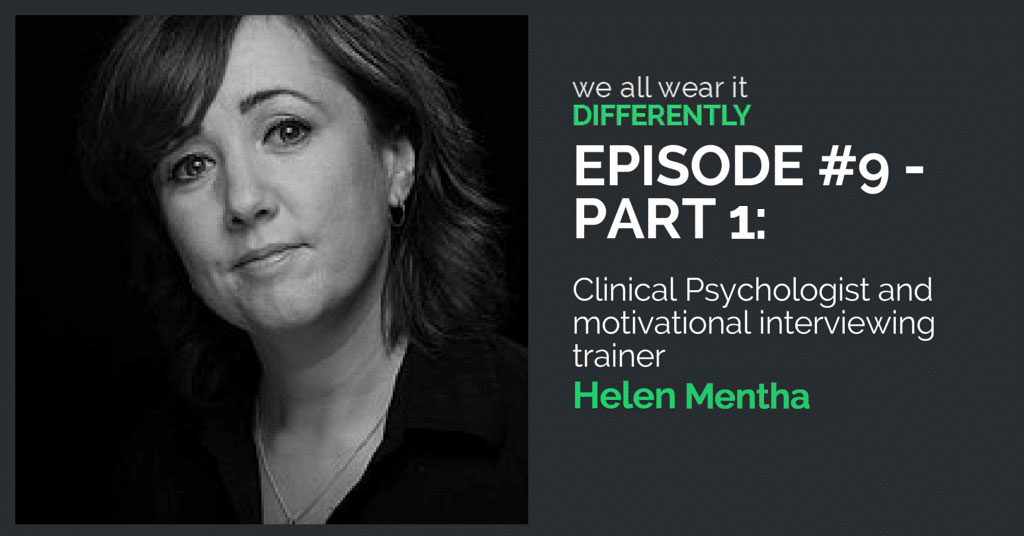#9 – Part 1: Motivational Interviewing Trainer and Clinical Psychologist Helen Mentha

Helen Mentha is a registered clinical psychologist and member of the Motivational Interviewing Network of Trainers (MINT Inc). She currently runs her own private consultancy Mentha Consulting where she provides Specialist Training in Motivational Interviewing and consultation. Prior to this Helen worked for many years in the drug and alcohol field as a counsellor, dual diagnosis senior clinician, manager, and supervisor.
Helen is committed to ethical, respectful person-centred care and brings this ethos to her clinical and supervision practice, training, and consultation. She is highly experienced and a sought after facilitator with a reputation for accessible, engaging, well-informed and practical training in a positive learning environment. She has trained professionals from a diverse range of backgrounds and areas of focus, including drug and alcohol, mental health, medical and nursing, allied health, community welfare, aged care, forensic, education, and corporate settings. She has provided training across Australia and in China and has collaborated with colleagues from Australia, New Zealand, the United Kingdom, the United States, and China to provide training and program development.
Helen told me she’s counted 400 days of her life that she's spent standing in front of large groups of people and speaking, and for a self-described introvert, she says she is still amazed by this. According to Helen curiosity about her self, others and the world, as well as playing to her strengths, have helped her to achieve this which she so generously discusses throughout the interview.
Read on for Helen's words of wisdom and check out Part 2 of this interview with Helen Menther to hear more about motivational interviewing.
Helen's Suggested Resources
- A great collection of thoughts on therapy: Irving Yalom (2002) The Gift of Therapy. Harper Collins.
- A profound read on the fundamental importance of meaning in our lives: Viktor Frankl (1946) Man’s Search for Meaning. Viktor Frnakl was a Jewish psychiatrist imprisoned in the holocaust. This stark but strangely uplifting read is a must for anyone working in the helping professions.
- For a 5 minute rare clip of Viktor Frankl, go here: https://www.ted.com/
talks/viktor_frankl_youth_in_ search_of_meaning - One hour free learning module on MI: http://learning.bmj.com/
learning/module-intro/ motivational-interviewing. html?moduleId=10051582 - Core text for Motivational Interviewing: http://www.
guilford.com/books/ Motivational-Interviewing/ Miller-Rollnick/9781609182274
Helen's Extra Tips
- Get substantial experience in the public system as early as possible, preferably in multidisciplinary teams.
- At some point, do the hard work, the difficult work, the challenging work. You will grow and learn with your clients faster than when the work is easy. Choosing challenges you find meaningful helps.
- Everything is a learning experience. The bad workplaces, the boring tasks, everything that you struggle with your clients will too. Bringing curiosity to the experience helps soften the impact and it may transform it into something helpful in the future.
- Look after yourself – you are half of the relationship and therefore half of the work. Your wellbeing is where the work comes from. You can’t listen as well when you are stressed or exhausted. Burnout isn’t fun.
- Take care of your half of the conversation – be thoughtful in what you say and how you say it – and be curious what the client offers in their half.
- You are never alone in a conversation and the other person is often giving us feedback on how we are going. E.g. “Yes, but” from a client usually means you are being too directive or moving too fast – you might just be inviting them to argue against positive change.
- Hone your strengths and find ways to minimise the impact of your weaknesses, rather than try to be great at everything – try to discover ways to offer your clients your best version of you. If they need something you can’t offer, help them find someone who can.
- Sometimes clients don’t need therapy as much as getting into kickboxing or burlesque. We can get blinkered into thinking within the discipline.
- Get supervision. If good supervision isn’t available in your workplace, get external supervision. It is a professional necessity and needs to be prioritised like meeting registration criteria and maintaining ongoing professional development.
- Find the work mix that works for you – this might involve focusing on one role or combination of different roles such as therapy, research, training, writing, projects, supervising, part-time bricklaying or dog grooming.
- At some point you may need to decide whether to be a specialist (eg senior clinician) or an administrator (eg team leader or manager). One specialises in the content of the field, the other manages the resources.
- At the end of the day, our work is about facilitating better quality of life. And we can’t know what that means or how to work toward that without working together in partnership with the client.
Helen's Self-Care Tip
Give yourself permission to be as human as your clients!
Get a sense of what your balance is (e.g. do you need variety), work out a good mix of work that suits you, and stay curious.
Remember self-care is part of the work.
Feedback
Leave me a comment or some feedback about this episode in the comments section. I'll respond to everyone!
- # 63 – Paediatric Chronic Pain with Dr Nicki Ferencz - November 13, 2020
- # 64 – Chronic Pain with Sports and Exercise Psychologist Damien Stewart - November 11, 2020
- # 62 – Pain Management with Dr Jacqui Stanford - November 8, 2020
